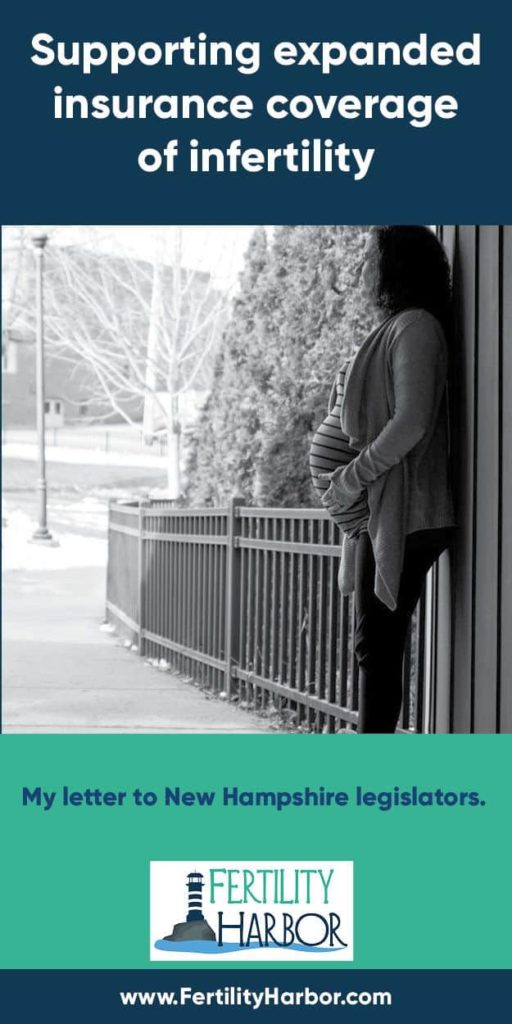UPDATE: On August 1, 2019, Governor Sununu signed SB 279 into law. Hurray!
Today I submitted the following letter to the New Hampshire Legislature regarding SB 279, which would expand health insurance coverage for infertility. For more information about insurance requirements in each state, visit the Resolve website.
My post Insurance Coverage for Fertility Treatment: 8 Things to Know is a helpful resource for navigating the health care maze.
In this letter, I specifically mention the fact that we did not have insurance coverage for our IUIs. For more about that, check out the post How Much Does an IUI Cost Without Insurance?
February 5, 2019
The Honorable Kevin Cavanaugh
Senate Commerce Committee
State House, Rm 100
Concord NH 03301
Re: SB 279, an Act Relative to Access to Fertility Care
Dear Chairman Cavanaugh and Members of the Senate Commerce Committee:
I am writing today to express my support for SB 279, a much-needed bill that would increase access to affordable fertility treatment for families across the state.
Although SB 279 will not benefit me directly, these issues are very important to me. My husband and I waited until we thought were financially and emotionally prepared to start a family. That plan hit a snag when I was diagnosed with polycystic ovarian syndrome (PCOS) at the age of 33. It is estimated that 1 of every 10 women of childbearing age has PCOS, so this story is far from unique. Mine has a happy ending, though, because I had excellent health insurance and access to amazing doctors. Not everyone is so lucky.
I got pregnant with my twins on my seventh medicated cycle. My insurance company paid about $4,200 for the testing, office visits, and ultrasounds involved. That total does not include the four IUIs we did, which our insurance plan did not cover, or the cost of pills and injections. (It also does not include prenatal care or the delivery of the babies.) If we had to pay for these costs completely out-of-pocket, we would have ended up in significant debt. It is possible we wouldn’t have children at all right now, which is heartbreaking to think about.
An outsider may be tempted to say, “If you wanted children you should have saved up!” but that is almost impossible to do. As in other areas of our health care system, high prices and a lack of transparency are serious challenges for fertility patients. Patients can’t budget effectively when they have no control over:
- The health insurance plans that their employer offers
- What their doctor charges for services
- What their medication costs (a single cycle’s worth of fertility injections can equal a mortgage payment for many families)
- How they respond to any particular treatment protocol
- Most aspects of their medical history related to fertility (such as endometriosis, ovarian cysts, thyroid disease, genetic factors, cancer, etc.)
Even if couples without adequate insurance coverage can afford to pay (or, more likely, borrow) tens of thousands of dollars for fertility treatment, the financial pressure can push them toward higher-risk choices. For example, triggering with lots of mature follicles or transferring multiple embryos in an IVF cycle increase the odds of pregnancy – but these strategies also increase the chance of conceiving twins, triplets, or even quadruplets.
Expanded insurance coverage for fertility treatment would let couples and doctors focus on conservative approaches that are more likely to lead to the birth of one healthy child. My twins were born at full term, but we were lucky. Multiples pregnancies often mean significant complications, pre-term delivery, and extended NICU stays – all of which can cost more than fertility treatment.
I always hear about the need to attract young families to New Hampshire to offset our aging population. These discussions usually focus on expanding employment opportunities and affordable workforce housing. While you are debating those issues please don’t forget those of us who desperately want to raise our children here, but need a little help achieving the pregnancy first.
On behalf of New Hampshire families like mine, thank you for considering this important piece of legislation.
Sincerely,
Jennifer Hastings
[My legal address in New Hampshire]
fertilityharbor.com



 I’m Jenn! Here I am with my beautiful twin boys. My pregnancy was possible thanks to fertility treatment for PCOS.
I’m Jenn! Here I am with my beautiful twin boys. My pregnancy was possible thanks to fertility treatment for PCOS.
